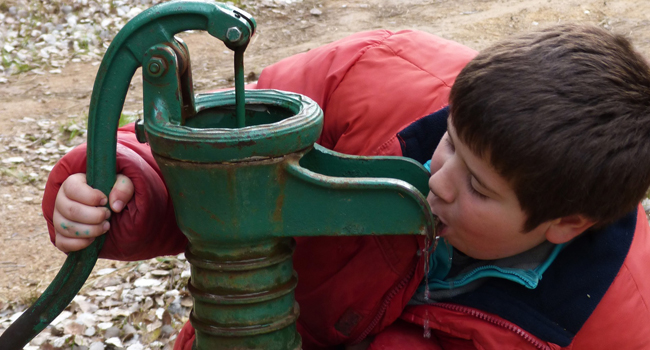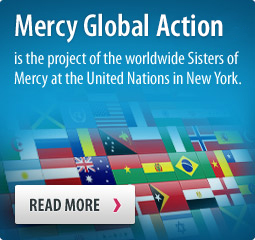
Mercy & Global Water Justice Allies Write Letter to the Sec-Gen of the UN on the Human Right to Water and Sanitation!
Special Reports: April 30, 2016
Marking the April 22 International Mother Earth Day and the signing of the Paris Agreement on Climate Change, the Sisters of Mercy at the UN and the NGO Mining Working Group delivered a letter to the Secretary General of the United Nations. Endorsed by networks, organizations, and congregations who are part of the global water justice movement, the letter calls attention to the recently-established UN High Level Panel on Water.

The Panel has two primary aims: 1) to 'motivate action' on the water Sustainable Development Goal (SDG 6) by focusing on 'public policy dialogue, private sector models and civil society initiatives towards the Water SDG'; and, 2) to 'advocate on financing and implementation' by ratcheting up investment in the water sector.
The global water justice movement’s letter raises concerns regarding the Panel’s mandate as it is currently understood. The letter urges the Secretary-General to ensure that the Panel promotes the realization of the human right to water and sanitation for all in SDG 6 implementation of the 2030 Agenda for Sustainable Development.
What are the concerns?
In their letter, the Sisters of Mercy and the global water justice movement note that the Panel’s stated mandate and governance emphasize private sector financing for SDG 6 and private participation in the water and sanitation sectors, despite overwhelming evidence that such solutions fall far short of ensuring the human right to water and sanitation for all and can even increase inequalities in water access.
The letter cites a report from UN DESA demonstrating the high social and financial costs of Public Private Partnerships (PPPs) and a report from the World Bank on the inherent limitations of Private Participation in Infrastructure (PPI). The letter also notes the high levels of legal impunity with which transnational corporations often operate, leaving space for private interests to be served as a priority over human rights concerns, the public interest, and the environment.
For these reasons, since the start of negotiations on the Sustainable Development Goals, the Sisters of Mercy at the UN, the NGO Mining Working Group, and colleagues of global water justice movement have actively called for the recognition of the human right to water and sanitation and for essential public services to be ring-fenced from private sector participation as Member States implement the 2030 Agenda for Sustainable Development.
The letter urges the Secretary-General to ensure that the primary focus of the Panel will promote the realization of the human right to water and sanitation for all, and will look critically at where this principal concern conflicts with other interests. The movement’s network will continue to raise the concerns of those at the frontlines and to vigilantly monitor the implementation of SDG 6.

As the 2030 Agenda for Sustainable Development unfolds, Mercy’s unrelenting advocacy regarding the human right to water and sanitation will closely follow negotiations leading up to the Agenda's adoption. We continue to stand in solidarity with those impacted by violations of the human right to water and sanitation and to hold our global leaders and governments to account as they move to make progress on the SDGs.
Along with further advocacy on the human right to water and sanitation, in the coming months Mercy Global Action at the UN will work with colleagues in the NGO Mining Working Group and water justice allies to finalize a water justice guide for implementation of SDG 6. We invite you to utilize and share the guide when it becomes available in July 2016.
For more information on the subject of public financing, see the toolkit Public Financing: Ensuring Just and Sustainable Water Infrastructure developed by water justice groups in collaboration with the Blue Planet Project. The toolkit uses accessible language to break down the issue into three sub-topics: the failures of private financing; how public financing is possible; and how to make public financing work for our communities.
Messages to: Áine O’Connor rsm - Mercy Global Action Coordinator at the UN




